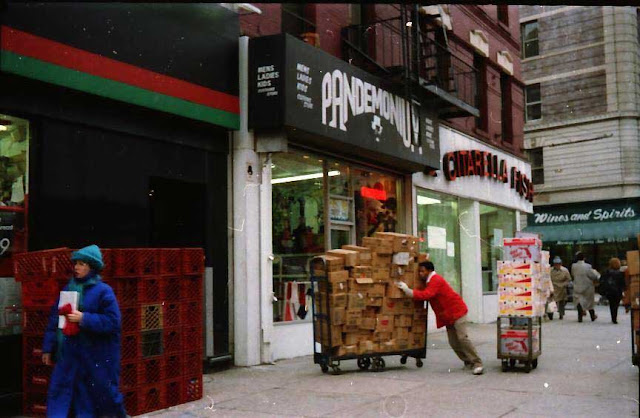Pandemonium, Fairway, and Citarella at Broadway and 75th Street, Manhattan
 |
| Broadway between 74th and 75th Streets, NYC, in the 1980s. |
Sometimes, the changes in one block can tell you a lot about the changes in the broader society. One block on Manhattan's Upper West Side presents such an opportunity. We are going to talk about three stores in particular on that block: Pandemonium, Fairway, and Citarella. Pandemonium was (and is) a specialty boutique for women's clothing. Citarella was (and is) a gourmet market. Fairway Market was (and is) a grocery chain. All at one time or another have occupied space on the same block on Broadway. Since I came across the above photo from the 1980s showing all three stores, I wondered what had happened there during the subsequent three decades. So, this is
a comparison of the east side of Broadway between 74th and 75th Streets from the 1980s to 2017.
 |
| Broadway between 74th and 75th Streets, NYC, in November 2017 (Google Street View). |
Checking back in 30 years later, we find that not much has changed. Citarella, at 2135 Broadway on the southwest corner of Broadway and West 75th Street, is still there. It took over the Pandemonium space in 1993. Citarella appears to be doing well, with a much classier facade these days, reflecting the rise in gourmet groceries over the past few decades. Fairway Market (founded in the early 1930s), which is just visible in the 1980s photo on the left, is also still there and, in fact, has taken over the entire rest of the block. It is considered a "high-end produce shop," a category which has exploded in popularity in recent decades. Incidentally, Fairway has taken over a coffee shop and a Bingo Parlor ("Broadway Hall") on the southern end of the block since the original photo was taken.
 |
| While not very visible in the 1980s photograph, Fairway has expanded over the intervening decades and now dominates the block on the west side of Broadway between 74th and 75th Streets (Google Street View). |
We notice from comparing the two photos that, in both, someone is bringing stock into Fairway (and also Citarella in the more recent photos, that is a white Citarella truck parked out front on the right). Some things never change.
 |
| Broadway between 74th and 75th Streets, NYC, in November 2017 (Google Street View). |
Also visible in the 1980s photo in the background is The Astor at 235 West 75th Street, on the northwest corner of Broadway and 75th Street. The Astor is another of those venerable pre-war apartment buildings, having been built in 1901. It looks like nothing much has changed about it, buildings like that pretty much shrug off the passage of decades (given increasingly more expensive proper maintenance). If someone were standing in the same spot as the original photographer in the 1980s and were whisked forward to 2018, the scene would look pretty much the same.
 |
| Northwest corner of Broadway at West 75th Street, Manhattan (Google Street View). |
Zeroing in on the Astor gives a little more nuance to the changes in the area. In the 1980s photo, there was a liquor store on this corner ("Wines and Spirits"). In late 2017, however, there is a Lululemon store. Lululemon is a "High-end yoga-focused chain featuring stylish athletic wear & accessories (most offer free classes)." I think it is fair to say that Lululemon caters to a primarily female clientele and that women's athletic apparel has risen greatly in popularity. Circling around to the changes on the block just to the south, Pandemonium may be gone, but Lululemon has arrived. The basic needs of the community have not changed, there simply has been shuffling of the deck. Liquor stores are the odd man out, not women's clothing stores - they've fallen completely out of favor over the intervening decades. So, the changes on this one block of the Upper West Side shows how changes at the macro level filter down over time to the micro level.
Anyway, I hope you enjoyed this entry in my "the more things change, the more they stay the same" series. Please visit some of my other pages where I compare the past with the present and see if that tells us anything about how cities change to meet the needs of their inhabitants.
2019





No comments:
Post a Comment